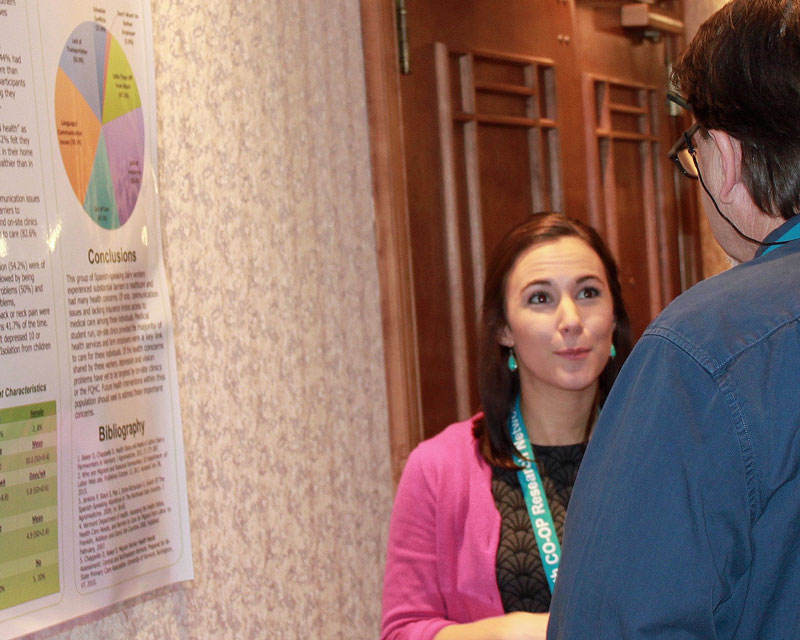“Why can’t more of our best discoveries actually make their way into our practices, into our exam rooms, and to our patients?”
The question was a rhetorical one being asked by Jack Westfall, MD, MPH, chief medical officer and director of the High Plains Research Network, as he made his keynote address to a large group of attendees at the Dartmouth CO-OP Primary Care Research Network annual meeting, held recently in North Conway, NH.
Westfall had just shared some sobering statistics: it takes 17 years for only 14 percent of new scientific discoveries to enter daily clinical practice, only about 50 percent of Americans receive recommended preventive care such as colorectal cancer screenings, and while only one patient per thousand is cared for in academic medical centers—that’s where the bulk of medical research is done. “And we wonder why our research isn’t relevant to our communities,” he said.
Rather than being discouraged by those numbers, the mood of this group of primary care practitioners and researchers, who are dedicated to improving patient care and the practice of primary care in rural communities across New Hampshire, Vermont, and Maine remained upbeat and optimistic. They had some good reasons to be.
Westfall’s engaging stories about doing what’s called practice-based research (in primary care practices) and participatory research (in community settings with patients and families), to address health issues like high asthma rates in his home state of Colorado, were informative and inspiring.
While practice based research networks have been around for decades—the Dartmouth CO-OP was established as a voluntary and cooperative network in 1972 by the Department of Community and Family Medicine at Dartmouth Medical School—new opportunities are on the horizon.
“We asked Jack Westfall to be here because he’s out on the far end of the curve in doing this kind of research and there isn’t anybody who could tell us more about what we can expect to see in the future,” said Jack Kirk, MD, a practicing internist in New London, NH, and longtime Dartmouth CO-OP member “This is an exciting time. We’re seeing enthusiasm across generations of clinical people, and there’s a real coalescence of positive forces.”
Those forces include greater recognition by funding organizations such as the National Institutes of Health (NIH) of the critical role practice based research networks like the CO-OP have to play in moving more new treatments into daily practice. And tertiary medical centers are eager to work more actively with practice and community based researchers as their focus shifts to population health and aligning with outcomes-based payment models.
As a case in point, SYNERGY—Dartmouth’s Clinical and Translational Science Institute, which is funded by the National Center for Advancing Translational Sciences of the NIH, served as primary sponsor of this annual meeting, along with other programs from the Geisel School of Medicine and Dartmouth-Hitchcock.
“Thanks to SYNERGY’s very generous support, we had the biggest turnout we’ve ever had for an annual meeting, and more first-year attendees than we’ve had in many years,” said Deb Johnson, MHA, executive director of the Dartmouth CO-OP. “And this was the first year that we’ve had patient and/or family representatives here. This is an important step—by sharing their experiences and knowledge of their communities, they’re adding a vital dimension to our work.”
Meeting organizers were able to provide food, lodging, and a full menu of activities over 2 ½ days: including presentations on local projects—such as improving HPV vaccination rates in a community health center—and new research opportunities, and workgroup sessions on a variety of topics, like changing roles in primary care.
“The CO-OP has been an awesome resource for us and the experience we’re gaining in how to do research in underserved areas is invaluable,” said Caledonia Moore, a second-year medical student and rural health scholar at Geisel who did a poster presentation on the Migrant Health Project, which provides on-site mobile clinics for Spanish speaking dairy farm workers.

For Melanie Lawrence, MD, the CO-OP is beneficial on multiple levels. “As a solo practitioner in rural Vermont, it provides intellectual stimulation and collegiality that I wouldn’t have otherwise,” she said. “I love being able to pose clinical questions that have meaning to my practice and to my community, research them, and then discuss them with like-minded people.”
“And having folks from SYNERGY and Dartmouth-Hitchcock now doing outreach in our communities and working with us on how we can address pressing issues like the substance abuse crisis is a godsend,” she added.
Ardis Olson, MD, a primary care researcher and mainstay of the Dartmouth CO-OP, who has served as its research director for the past six years, agrees. “With the new opportunities for funding, resources, and support they are bringing, SYNERGY and others have infused a new level of excitement into our efforts,” she said. “These partnerships will be essential to sustaining a vital, energetic, and collaborative research community in the future.”